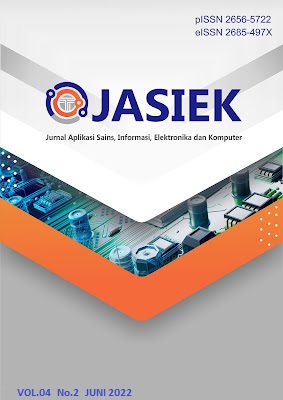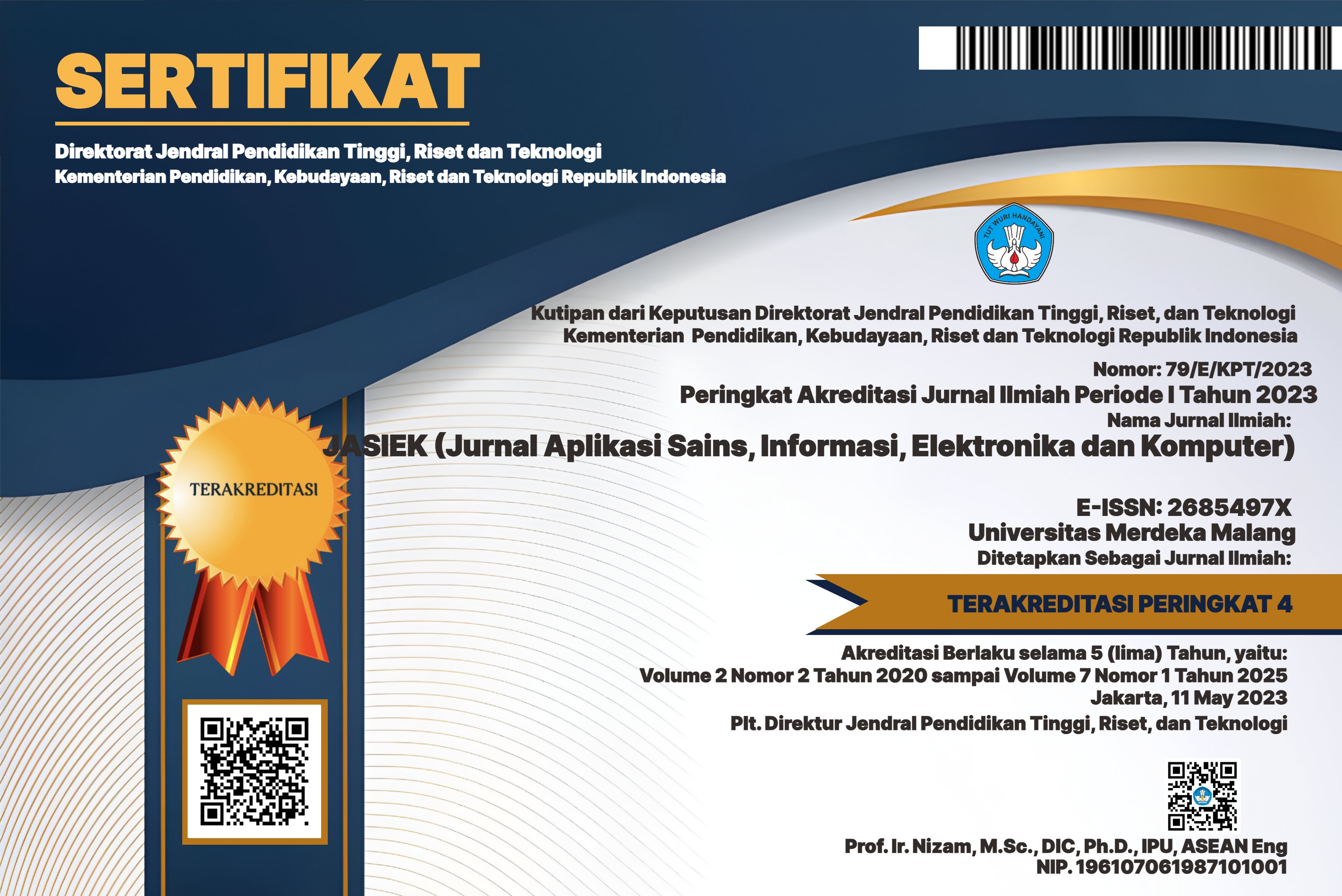Stopkontak Pintar Berbasis Internet of things sebagai Solusi Manajemen Energi Listrik dengan Menggunakan Aplikasi Android
DOI:
https://doi.org/10.26905/jasiek.v4i2.8332Keywords:
Android, Electric Socket, Electrical Energy, Energy Management, Internet of ThingsAbstract
Leaving an electrical appliance connected to an outlet when not in use or on standby accounts for 80% of electricity wastage. A study conducted by the Lawrence National Laboratory, it was revealed that when a cellphone charger is still connected to a wall socket when not in use, there is still power being released. The purpose of this research is to make a smart socket based on the Internet of things (IoT) to be able to save electricity. An IoT smart socket that is designed to be integrated with an Android-based smartphone application. The IoT smart socket uses the ACS-712 current sensor and the ZMPT101B voltage sensor to measure electrical energy and then uses the Arduino Nano microcontroller and NodeMCU ESP8266 so that the socket can communicate with the Google Firebase cloud via Wi-Fi connection to the internet. The IoT smart socket uses a relay module as a switch, and the micro SD and RTC DS3231 modules record and store data (data logging) of electrical energy information that has been issued. The IoT smart outlet is integrated with Android smartphone applications created through Android Studio. The IoT smart socket in this study has 2 socket holes and features Wi-Fi pairing, electrical energy measurement, data logging, and socket scheduling (timer). The IoT smart outlet has an average measurement error of 3.27% when compared to a measuring instrument, and there is an error in the outlet timer feature with a delay of 5 to 30 seconds. The IoT smart socket is still said to be valid and can function properly.Downloads
References
A. R. Sihombing, “Penghematan Energi untuk Lampu dan Pendingin Ruangan (AC) Menggunakan Mikrokontroler Arduino dan Metode Decision Tree,†2019.
M. Manoa, M. Rumbayan, and H. Tumaliang, “Audit Energi dan Redesign Instalasi Listrik di TVRI Sulut,†Jurnal Teknik Elektro dan Komputer, vol. 8, no. 2, pp. 59–66, 2019.
T. B. Basyiran, “Konsumsi Energi Listrik, Pertumbuhan Ekonomi dan Penduduk terhadap Emisi Gas Rumah Kaca Pembangkit Listrik di Indonesia,†Skripsi Sarjana Fakultas Ekonomi, Universitas Syiah Kuala, 2014.
R. R. al Hakim, “Model energi Indonesia, tinjauan potensi energi terbarukan untuk ketahanan energi di Indonesia: Sebuah ulasan,†Jurnal Pengabdian Kepada Masyarakat, vol. 1, no. 1, 2020.
M. Kurdi, “Hemat energi listrik: studi kasus di badan diklat provinsi Banten,†Jurnal Lingkaran Widyaiswara, vol. 3, pp. 47–52, 2016.
R. I. Kesuma, M. Y. Darmawan, and H. B. Firmansyah, “Sistem Peringatan Dini untuk Pemborosan Penggunaan Listrik pada Masyarakat Provinsi Lampung dengan Menggunakan Model Analisis Regresi Linier dan SMS Gateway,†Electrician, vol. 13, no. 1, pp. 13–18, 2019.
H. Herpendi, A. Noor, and R. Sayyidati, “Pengembangan Asisten TV Berbasis Internet of Things (IoT) untuk Efisiensi Penggunaan Energi Listrik,†Jurnal Eksplora Informatika, vol. 9, no. 2, pp. 96–104, 2020.
R. J. Setiawan, A. W. Atmoko, and I. Fauzi, “IoT-Based Electric Vampire Remover to Overcome Electric Vampire On Electronic Equipment,†JTECS: Jurnal Sistem Telekomunikasi Elektronika Sistem Kontrol Power Sistem dan Komputer, vol. 1, no. 2, pp. 115–124, 2021.
“Percaya atau Tidak, Hal Sepele Ini Bisa Bikin Tagihan Listrik Anda Berkurang.†https://finance.detik.com/energi/d-2895636/percaya-atau-tidak-hal-sepele-ini-bisa-bikin-tagihan-listrik-anda-berkurang (accessed Sep. 05, 2022).
A. Prastiantari and F. Hermin, “SKOPIN (STOP KONTAK PINTAR) PENGENDALI ARUS LISTRIK MENGGUNAKAN TIMER PADA STOP KONTAK BERBASIS ARDUINO,†J-KOMA: Jurnal Ilmu Komputer dan Aplikasi, vol. 1, no. 1, 2017.
Y. Yudhanto and A. Azis, Pengantar Teknologi Internet of Things (IoT). UNSPress, 2019.
N. Amaro, “Sistem monitoring besaran listrik dengan teknologi IoT (Internet of Things),†Fakultas Teknik Universitas Lampung. Bandar Lampung, 2017.
Downloads
Published
Issue
Section
License
Authors who publish with this journal agree to the following terms:
The journal allow the authors to hold the copyright without restrictions and allow the authors to retain publishing rights without restrictions.
Authors retain copyright and grant the journal right of first publication with the work simultaneously licensed under a Creative Commons Attribution-ShareAlike 4.0 International License that allows others to share the work with an acknowledgement of the work's authorship and initial publication in this journal.
Authors are able to enter into separate, additional contractual arrangements for the non-exclusive distribution of the journal's published version of the work (e.g., post it to an institutional repository or publish it in a book), with an acknowledgement of its initial publication in this journal.
Authors are permitted and encouraged to post their work online (e.g., in institutional repositories or on their website) prior to and during the submission process, as it can lead to productive exchanges, as well as earlier and greater citation of published work (See The Effect of Open Access).

This work is licensed under a Creative Commons Attribution-ShareAlike 4.0 International License.











